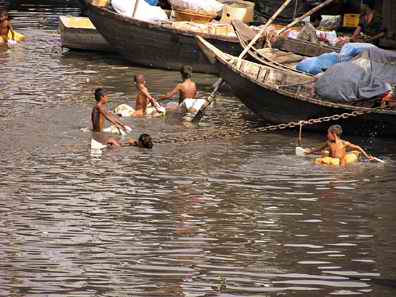Saving rivers that only exist in name
 The press has been reporting intermittently and prominently on the state of the rivers which flow past or through the Dhaka city. The rivers were once environmentally very useful for the city. The free flowing rivers in the past were very appealing to its residents. They played a part in transportation of people and cargoes and also supplied varieties of fishes to local markets, apart from being a source of water for drinking and cleaning purposes.
The press has been reporting intermittently and prominently on the state of the rivers which flow past or through the Dhaka city. The rivers were once environmentally very useful for the city. The free flowing rivers in the past were very appealing to its residents. They played a part in transportation of people and cargoes and also supplied varieties of fishes to local markets, apart from being a source of water for drinking and cleaning purposes.
With time, the importance of the rivers have been on the rise. These have become major suppliers of water for various household uses to the city's over 10 million people. But questions are being posed more and more gravely whether the rivers are any more fit to be relied on as suppliers of waters for drinking and for other uses at homes on treatment.
The quality of the waters of rivers has been deteriorating for a long time. But the point to note is that this degradation from discharge of industrial effluents and human excreta have gone on virtually unchecked with the outcome that the rivers have become too dangerously polluted. The water treatment plants that filter the surface water of the rivers for supplying to residents of the city are getting overwhelmed by the too great level of pollutants in it.
The plants are failing to supply reasonably clean water to citizens and, as a consequence, all sorts of diseases ranging from intestinal ones to even forms of cancer are increasingly afflicting many of those who have no choice but to consume such waters. Children, specially, are found to be the worst victims of this impure water. In many areas of the city, water supplied by the Water and Sewerage Authority (WASA), stinks so badly and appears so unclean that people are at their wits' ends about how to carry on normal life with hardly any water that can be called hygienically safe. So, the magnitude of the problem is apparent. WASA says that the unclean water is mainly due to the inability to purify the too unclean river waters which constitute the main source of water supply for a major part of the city's population.
Therefore, the tasks of cleaning the rivers have assumed a great urgency that cannot wait. Immediate steps must be taken, whatever the costs, to reduce or put up barriers to the free discharge of all kinds of toxic effluents in the rivers. It was also reported that the human excreta that drain into the rivers are only partly treated and even that partial treatment process is not efficient. So, emergency actions are needed for installation of capacities at the fastest to treat all human excrement properly before being discharged into the rivers. It was heartening to note that the authorities have recently warned the polluting industries by the sides of rivers to acquire effluent treatment facilities within a short time, failing which they would be closed down. This warning must be very sternly enforced. The message must be firmly communicated to the offending industries that government truly means business and would not allow extension of time unlike in the past.
Only the strong commands, backed up by real threats, will lead to results as past experiences suggest. Pleadings from their operators that the government would cause reversal in industrialisation or put the existing industries under a financial stress by ordering the quickest compliance in this regard, must not slacken the official determination to compel these industries to carry out their pertinent responsibilities within the allowed time-frame.
(Source: The Financial Express, April 09, 2007 )
Top of page
Back to Environment
Home
The press has been reporting intermittently and prominently on the state of the rivers which flow past or through the Dhaka city. The rivers were once environmentally very useful for the city. The free flowing rivers in the past were very appealing to its residents. They played a part in transportation of people and cargoes and also supplied varieties of fishes to local markets, apart from being a source of water for drinking and cleaning purposes.